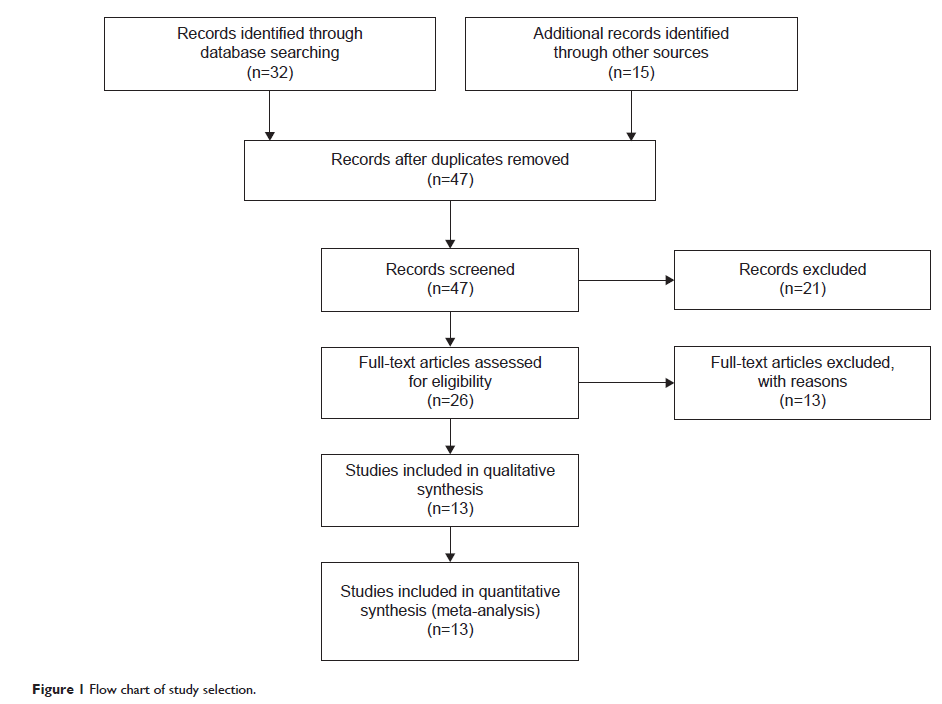109669
论文已发表
注册即可获取德孚的最新动态
IF 收录期刊
- 3.4 Breast Cancer (Dove Med Press)
- 3.2 Clin Epidemiol
- 2.6 Cancer Manag Res
- 2.9 Infect Drug Resist
- 3.7 Clin Interv Aging
- 5.1 Drug Des Dev Ther
- 3.1 Int J Chronic Obstr
- 6.6 Int J Nanomed
- 2.6 Int J Women's Health
- 2.9 Neuropsych Dis Treat
- 2.8 OncoTargets Ther
- 2.0 Patient Prefer Adher
- 2.2 Ther Clin Risk Manag
- 2.5 J Pain Res
- 3.0 Diabet Metab Synd Ob
- 3.2 Psychol Res Behav Ma
- 3.4 Nat Sci Sleep
- 1.8 Pharmgenomics Pers Med
- 2.0 Risk Manag Healthc Policy
- 4.1 J Inflamm Res
- 2.0 Int J Gen Med
- 3.4 J Hepatocell Carcinoma
- 3.0 J Asthma Allergy
- 2.2 Clin Cosmet Investig Dermatol
- 2.4 J Multidiscip Healthc

已发表论文
RUNX3 在非小细胞肺癌 (NSCLC) 治疗中的临床病理意义和潜在药物靶向:一项综合分析
Authors Xu L, Lan H, Su Y, Li J, Wan J
Published Date June 2015 Volume 2015:9 Pages 2855—2865
DOI http://dx.doi.org/10.2147/DDDT.S76358
Received 24 October 2014, Accepted 19 March 2015, Published 3 June 2015
Approved for publication by Dr Wei Duan
Background: Emerging evidence indicates that RUNX3 is a candidate tumor suppressor in several types of human tumors, including non-small cell lung cancer (NSCLC). However, the correlation between RUNX3 hypermethylation and clinicopathological characteristics of NSCLC remains unclear. Here, we conducted a systematic review and meta-analysis to quantitatively evaluate the effects of RUNX3 hypermethylation on the incidence of NSCLC and clinicopathological characteristics.
Methods: A detailed literature search was made using Medline, Embase and Web of Science for related research publications written in English. The methodological quality of the studies was evaluated. The data were extracted and assessed independently by two reviewers. Analysis of pooled data was performed. The odds ratio (OR) and hazard ratio were calculated and summarized.
Results: Final analysis of 911 NSCLC patients from 13 eligible studies was performed. We observed that RUNX3 hypermethylation was significantly higher in NSCLC than in normal lung tissue; the pooled OR from seven studies including 361 NSCLC and 345 normal lung tissue (OR 7.08, confidence interval 4.12–12.17, P <0.00001). RUNX3 hypermethylation may also be associated with pathological types. The pooled OR was obtained from eleven studies including 271 squamous cell carcinoma and 389 adenocarcinoma (OR 0.41, confidence interval 0.19–0.89, P =0.02), which indicated that RUNX3 hypermethylation is significantly higher in adenocarcinoma that in squamous cell carcinoma. We did not find that RUNX3 hypermethylation was correlated with clinical stage or differentiated status. However, NSCLC patients with RUNX3 hypermethylation had a lower survival rate than those without RUNX3 hypermethylation.
Conclusion: The results of this meta-analysis suggest that RUNX3 hypermethylation is associated with an increased risk and worse survival in NSCLC. RUNX3 hypermethylation, which induces inactivation of the RUNX3 gene, plays an important role in lung carcinogenesis and clinical outcome.
Keywords: RUNX3 , methylation, lung cancer, tumor suppressor gene, meta-analysis, odds ratio, hazard ratio
Methods: A detailed literature search was made using Medline, Embase and Web of Science for related research publications written in English. The methodological quality of the studies was evaluated. The data were extracted and assessed independently by two reviewers. Analysis of pooled data was performed. The odds ratio (OR) and hazard ratio were calculated and summarized.
Results: Final analysis of 911 NSCLC patients from 13 eligible studies was performed. We observed that RUNX3 hypermethylation was significantly higher in NSCLC than in normal lung tissue; the pooled OR from seven studies including 361 NSCLC and 345 normal lung tissue (OR 7.08, confidence interval 4.12–12.17, P <0.00001). RUNX3 hypermethylation may also be associated with pathological types. The pooled OR was obtained from eleven studies including 271 squamous cell carcinoma and 389 adenocarcinoma (OR 0.41, confidence interval 0.19–0.89, P =0.02), which indicated that RUNX3 hypermethylation is significantly higher in adenocarcinoma that in squamous cell carcinoma. We did not find that RUNX3 hypermethylation was correlated with clinical stage or differentiated status. However, NSCLC patients with RUNX3 hypermethylation had a lower survival rate than those without RUNX3 hypermethylation.
Conclusion: The results of this meta-analysis suggest that RUNX3 hypermethylation is associated with an increased risk and worse survival in NSCLC. RUNX3 hypermethylation, which induces inactivation of the RUNX3 gene, plays an important role in lung carcinogenesis and clinical outcome.
Keywords: RUNX3 , methylation, lung cancer, tumor suppressor gene, meta-analysis, odds ratio, hazard ratio
